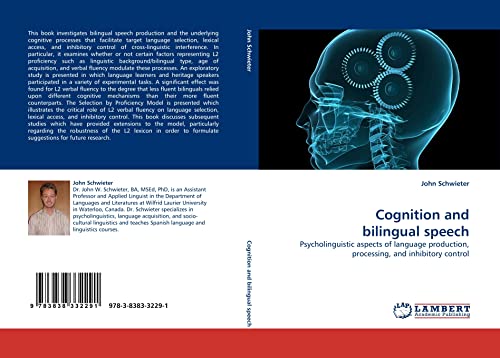Verwandte Artikel zu Cognition and bilingual speech: Psycholinguistic aspects...
Cognition and bilingual speech: Psycholinguistic aspects of language production, processing, and inhibitory control - Softcover

Inhaltsangabe
This book investigates bilingual speech production and the underlying cognitive processes that facilitate target language selection, lexical access, and inhibitory control of cross-linguistic interference. In particular, it examines whether or not certain factors representing L2 proficiency such as linguistic background/bilingual type, age of acquisition, and verbal fluency modulate these processes. An exploratory study is presented in which language learners and heritage speakers participated in a variety of experimental tasks. A significant effect was found for L2 verbal fluency to the degree that less fluent bilinguals relied upon different cognitive mechanisms than their more fluent counterparts. The Selection by Proficiency Model is presented which illustrates the critical role of L2 verbal fluency on language selection, lexical access, and inhibitory control. This book discusses subsequent studies which have provided extensions to the model, particularly regarding the robustness of the L2 lexicon in order to formulate suggestions for future research.
Die Inhaltsangabe kann sich auf eine andere Ausgabe dieses Titels beziehen.
Reseña del editor
This book investigates bilingual speech production and the underlying cognitive processes that facilitate target language selection, lexical access, and inhibitory control of cross-linguistic interference. In particular, it examines whether or not certain factors representing L2 proficiency such as linguistic background/bilingual type, age of acquisition, and verbal fluency modulate these processes. An exploratory study is presented in which language learners and heritage speakers participated in a variety of experimental tasks. A significant effect was found for L2 verbal fluency to the degree that less fluent bilinguals relied upon different cognitive mechanisms than their more fluent counterparts. The Selection by Proficiency Model is presented which illustrates the critical role of L2 verbal fluency on language selection, lexical access, and inhibitory control. This book discusses subsequent studies which have provided extensions to the model, particularly regarding the robustness of the L2 lexicon in order to formulate suggestions for future research.
„Über diesen Titel“ kann sich auf eine andere Ausgabe dieses Titels beziehen.
Gratis für den Versand innerhalb von/der Deutschland
Versandziele, Kosten & DauerNeu kaufen
Diesen Artikel anzeigenGratis für den Versand innerhalb von/der Deutschland
Versandziele, Kosten & DauerSuchergebnisse für Cognition and bilingual speech: Psycholinguistic aspects...
Cognition and bilingual speech: Psycholinguistic aspects of language production, processing, and inhibitory control : Psycholinguistic aspects of language production, processing, and inhibitory control
Anbieter: AHA-BUCH GmbH, Einbeck, Deutschland
Taschenbuch. Zustand: Sehr gut. Gebraucht - Sehr gut sg - ungelesenes mängelexemplar, gestempelt, mit leichten lagerspuren - This book investigates bilingual speech production and the underlying cognitive processes that facilitate target language selection, lexical access, and inhibitory control of cross-linguistic interference. In particular, it examines whether or not certain factors representing L2 proficiency such as linguistic background/bilingual type, age of acquisition, and verbal fluency modulate these processes. An exploratory study is presented in which language learners and heritage speakers participated in a variety of experimental tasks. A significant effect was found for L2 verbal fluency to the degree that less fluent bilinguals relied upon different cognitive mechanisms than their more fluent counterparts. The Selection by Proficiency Model is presented which illustrates the critical role of L2 verbal fluency on language selection, lexical access, and inhibitory control. This book discusses subsequent studies which have provided extensions to the model, particularly regarding the robustness of the L2 lexicon in order to formulate suggestions for future research. Artikel-Nr. INF1000426983
Anzahl: 1 verfügbar
Cognition and bilingual speech
Anbieter: buchversandmimpf2000, Emtmannsberg, BAYE, Deutschland
Taschenbuch. Zustand: Neu. Neuware -This book investigates bilingual speech production and the underlying cognitive processes that facilitate target language selection, lexical access, and inhibitory control of cross-linguistic interference. In particular, it examines whether or not certain factors representing L2 proficiency such as linguistic background/bilingual type, age of acquisition, and verbal fluency modulate these processes. An exploratory study is presented in which language learners and heritage speakers participated in a variety of experimental tasks. A significant effect was found for L2 verbal fluency to the degree that less fluent bilinguals relied upon different cognitive mechanisms than their more fluent counterparts. The Selection by Proficiency Model is presented which illustrates the critical role of L2 verbal fluency on language selection, lexical access, and inhibitory control. This book discusses subsequent studies which have provided extensions to the model, particularly regarding the robustness of the L2 lexicon in order to formulate suggestions for future research.Books on Demand GmbH, Überseering 33, 22297 Hamburg 184 pp. Englisch. Artikel-Nr. 9783838332291
Anzahl: 2 verfügbar
Cognition and bilingual speech: Psycholinguistic aspects of language production, processing, and inhibitory control
Anbieter: Revaluation Books, Exeter, Vereinigtes Königreich
Paperback. Zustand: Brand New. 184 pages. 8.66x5.91x0.42 inches. In Stock. Artikel-Nr. 3838332296
Anzahl: 1 verfügbar
